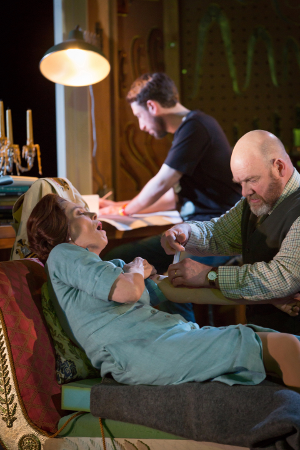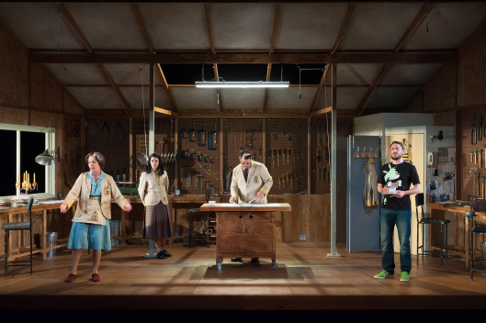![Robyn Allegra Parton as Peg [Photo © ROH. Photo By Stephen Cummiskey]](http://www.operatoday.com/2715%20TVOT%3B%20ROBYN%20ALLEGRA%20PARTON%20AS%20PEG.png)
03 May 2015
The Virtues of Things
A good number of recent shorter operas, particularly those performed in this country, made a stronger impression with their libretti than their scores.
English Touring Opera are delighted to announce a season of lyric monodramas to tour nationally from October to December. The season features music for solo singer and piano by Argento, Britten, Tippett and Shostakovich with a bold and inventive approach to making opera during social distancing.
This tenth of ten Live from London concerts was in fact a recorded live performance from California. It was no less enjoyable for that, and it was also uplifting to learn that this wasn’t in fact the ‘last’ LfL event that we will be able to enjoy, courtesy of VOCES8 and their fellow vocal ensembles (more below …).
Ever since Wigmore Hall announced their superb series of autumn concerts, all streamed live and available free of charge, I’d been looking forward to this song recital by Ian Bostridge and Imogen Cooper.
Although Stile Antico’s programme article for their Live from London recital introduced their selection from the many treasures of the English Renaissance in the context of the theological debates and upheavals of the Tudor and Elizabethan years, their performance was more evocative of private chamber music than of public liturgy.
Evidently, face masks don’t stifle appreciative “Bravo!”s. And, reducing audience numbers doesn’t lower the volume of such acclamations. For, the audience at Wigmore Hall gave soprano Elizabeth Llewellyn and pianist Simon Lepper a greatly deserved warm reception and hearty response following this lunchtime recital of late-Romantic song.
For this week’s Live from London vocal recital we moved from the home of VOCES8, St Anne and St Agnes in the City of London, to Kings Place, where The Sixteen - who have been associate artists at the venue for some time - presented a programme of music and words bound together by the theme of ‘reflection’.
'Such is your divine Disposation that both you excellently understand, and royally entertaine the Exercise of Musicke.’
‘And there was war in heaven: Michael and his angels fought against the dragon; and the dragon fought and his angels, And prevailed not; neither was their place found any more in heaven … that old serpent … Satan, which deceiveth the whole world: he was cast out into the earth, and his angels were cast out with him.’
There was never any doubt that the fifth of the twelve Met Stars Live in Concert broadcasts was going to be a palpably intense and vivid event, as well as a musically stunning and theatrically enervating experience.
‘Love’ was the theme for this Live from London performance by Apollo5. Given the complexity and diversity of that human emotion, and Apollo5’s reputation for versatility and diverse repertoire, ranging from Renaissance choral music to jazz, from contemporary classical works to popular song, it was no surprise that their programme spanned 500 years and several musical styles.
The Academy of St Martin in the Fields have titled their autumn series of eight concerts - which are taking place at 5pm and 7.30pm on two Saturdays each month at their home venue in Trafalgar Square, and being filmed for streaming the following Thursday - ‘re:connect’.
The London Symphony Orchestra opened their Autumn 2020 season with a homage to Oliver Knussen, who died at the age of 66 in July 2018. The programme traced a national musical lineage through the twentieth century, from Britten to Knussen, on to Mark-Anthony Turnage, and entwining the LSO and Rattle too.
With the Live from London digital vocal festival entering the second half of the series, the festival’s host, VOCES8, returned to their home at St Annes and St Agnes in the City of London to present a sequence of ‘Choral Dances’ - vocal music inspired by dance, embracing diverse genres from the Renaissance madrigal to swing jazz.
Just a few unison string wriggles from the opening of Mozart’s overture to Le nozze di Figaro are enough to make any opera-lover perch on the edge of their seat, in excited anticipation of the drama in music to come, so there could be no other curtain-raiser for this Gala Concert at the Royal Opera House, the latest instalment from ‘their House’ to ‘our houses’.
"Before the ending of the day, creator of all things, we pray that, with your accustomed mercy, you may watch over us."
The doors at The Metropolitan Opera will not open to live audiences until 2021 at the earliest, and the likelihood of normal operatic life resuming in cities around the world looks but a distant dream at present. But, while we may not be invited from our homes into the opera house for some time yet, with its free daily screenings of past productions and its pay-per-view Met Stars Live in Concert series, the Met continues to bring opera into our homes.
Music-making at this year’s Grange Festival Opera may have fallen silent in June and July, but the country house and extensive grounds of The Grange provided an ideal setting for a weekend of twelve specially conceived ‘promenade’ performances encompassing music and dance.
There’s a “slide of harmony” and “all the bones leave your body at that moment and you collapse to the floor, it’s so extraordinary.”
“Music for a while, shall all your cares beguile.”
The hum of bees rising from myriad scented blooms; gentle strains of birdsong; the cheerful chatter of picnickers beside a still lake; decorous thwacks of leather on willow; song and music floating through the warm evening air.
![Robyn Allegra Parton as Peg [Photo © ROH. Photo By Stephen Cummiskey]](http://www.operatoday.com/2715%20TVOT%3B%20ROBYN%20ALLEGRA%20PARTON%20AS%20PEG.png)
A good number of recent shorter operas, particularly those performed in this country, made a stronger impression with their libretti than their scores.
Glare, performed in the Linbury just a few months ago, was a case in point; so, I think, was The Virtues of Things. The former work is highly plot-driven, more after the manner of a television drama than we tend to expect.; this is somewhat different, a welcome stab at a contemporary operatic comedy, but one whose words, by Sally O’Reilly, seem to get in the way of musical setting, which in turn, or perhaps even fundamentally, never seems able to free itself enough of those words. Maybe I am hopelessly outdated in thinking that a libretto should provide space for music and not attempt too much on its own, but this opera seems to offer some confirmation. The relationship between Wort and Ton has, of course, been the concern of many a treatise, and indeed a good few operas, but this work in three short acts, about eighty minutes in total, seemed rather too lengthy for its material. Capriccio it is not. I could not help but wonder whether it might have been better at about half the length, paired with another, contrasting work, as happened last year, in the first such collaboration between the Royal Opera, Aldeburgh, and Opera North: The Commission and Café Kafka.
 Fiona Kimm as Ellipsis, Paul Curievici as Eames, and Richard Mosley-Evans as Doctor Gravid
Fiona Kimm as Ellipsis, Paul Curievici as Eames, and Richard Mosley-Evans as Doctor Gravid
A traditionalist prop-making company, the de Selby family Business, is imperilled by illness, Parabola having fallen ill (the same illness will soon strike the other senior designer, Ellipsis), and then by the visit of a technologically-minded freelance replacement, Eames. There are some interesting enough observations upon the nature of stagecraft; should one, for instance, start with something naturalistic and generalise, or the other way around? But the thrust eventually seems to concern significance, in a more or less semiological sense. Ellipsis — yes, the clue, it would seem, lies in the name - reacts in absurdly strong fashion to the props and their meaning. Increasingly, the family seems incapable of distinguishing between art and reality, snatches of different operas on which it has worked appearing and taking over, until all fall down — and a bemused Eames departs.
The problem, as hinted above, seems to be that there is little space left for music, or at least that little space is created by it. Matt Rogers’s score is perhaps at its strongest in the broader distinctions it offers, the quasi-bureaucratic tidiness of the first act gradually disintegrating in parallel to the family’s minds. Instrumentation — string quintet and wind quintet — puts one in mind of an ensemble approaching, although not quite reaching, that of, say, Schoenberg’s First Chamber Symphony, and indeed, in the excellence of performance offered by the Aurora Orchestra and Richard Baker, there is something of that brilliance. Was that a deliberate nod towards Schoenberg’s score in the first act, when ‘complexity’ was discussed; or was it just my imagination? I am genuinely not sure, though I was intrigued by the thought itself and by the ambiguity of my response. Otherwise, however, the setting remains, at least for my taste, a little too closely tied to the needs of the words, rarely if ever breaking free and thus offering the prospect of higher conflict and/or integration. It is difficult, moreover, to perceive anything much in the way of affection or consideration for voices. Again, the words, it seems, take precedence.
 Fiona Kimm as Ellipsis, Robyn Allegra Parton as Peg, David Stout as Selby, and Paul Curievici as Eames
Fiona Kimm as Ellipsis, Robyn Allegra Parton as Peg, David Stout as Selby, and Paul Curievici as Eames
Within the frame of Bijan Sheibani’s sharp direction and Giles Cadle’s designs — an excellent, properly naturalistic workshop, transformed by the action and, at the end, by Matt Haskins’s striking lighting of the opera, The Virtues of Things — the cast did an excellent job. David Stout’s steadfast, honourable traditionalist and Fiona Kimm’s increasingly unhinged, often scene-stealing Ellipsis vied against Paul Curievici’s splendid stage and vocal presence, Robyn Allegra Parton’s often-high yet sometimes challengingly low soprano veering towards the youthful attractions of the latter, at least earlier on. Richard Mosley-Evans’s quack doctor did a fine turn too. Diction was excellent throughout. I simply wish there had been more of interest in the vocal and indeed in much of the instrumental writing.
Further performances will take place at the Linbury (5. 6 May), the Britten Studio, Snape (9 May), and the Howard Assembly Room, Leeds (15 May).
Mark Berry
Cast and production information:
Selby de Selby: David Stout; Ellipsis de Selby: Fiona Kimm; Peg de Selby: Robyn Allegra Parton; Eames: Paul Curievici; Dr Gravid: Richard Mosley-Evans. Director: Bihan Sheibani; Designs: Giles Cadle; Lighting: Matt Haskins. Aurora Orchestra/Richard Baker (conductor). Linbury Studio Theatre, Royal Opera House, London, Saturday 2 May 2015.